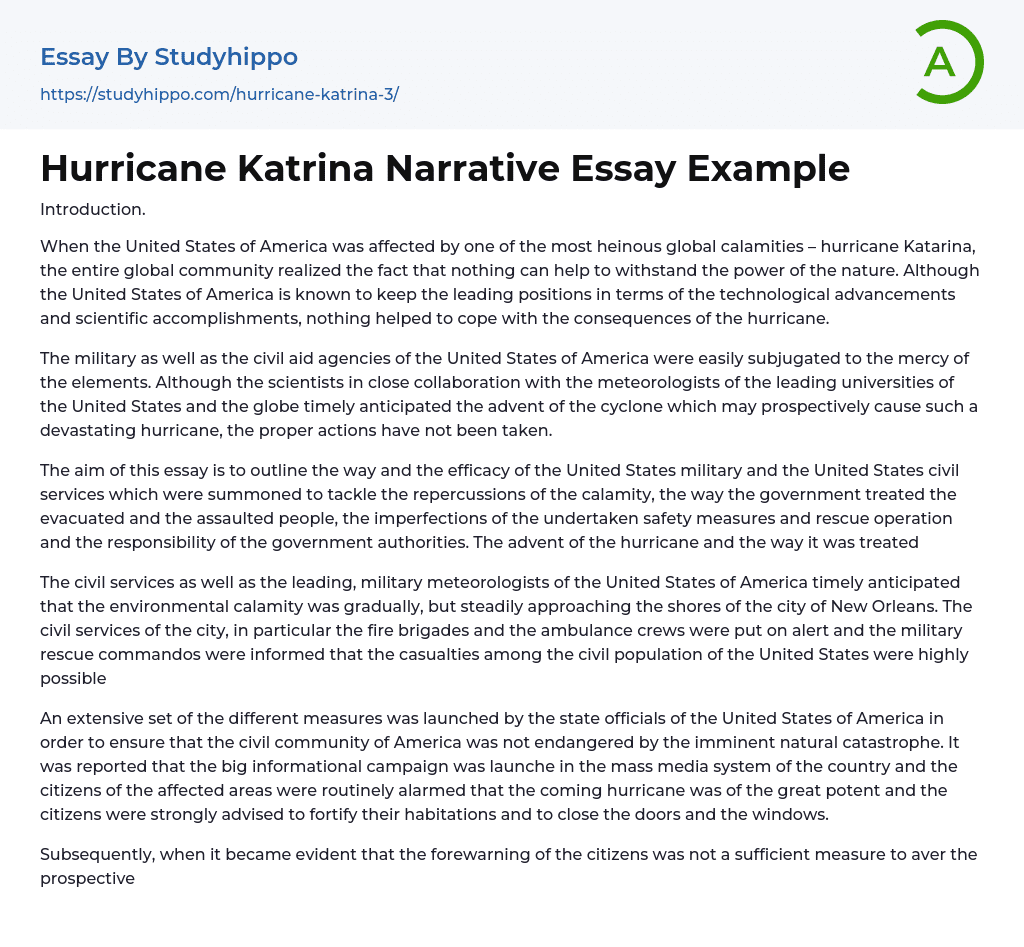Introduction.
When Hurricane Katrina hit the United States, it was a global reminder of nature's overwhelming power. Despite America's reputation for technological and scientific advancements, the country couldn't effectively handle the hurricane aftermath. The military and civil aid agencies were helpless against the elements. Although scientists and meteorologists from prestigious universities accurately forecasted the cyclone's arrival and its potential for destruction, no proper measures were taken.
This essay seeks to discuss the United States military and civil services' response to a calamity, including the government's treatment of evacuated and assaulted individuals, flaws in safety measures and rescue operations, and government authorities' accountability. The United States military and civil services, along with leading meteorologists, were aware of an approaching environmental disaster in New Orleans. The city's civil services, such as fire brigades and
...ambulance crews, were alerted, and military rescue commandos were informed about potential casualties among the population. State officials implemented various measures to ensure the safety of American citizens, including an extensive informational campaign in the mass media. Residents in affected areas were repeatedly warned about the power of the oncoming hurricane and advised to reinforce their homes and secure doors and windows.When it became clear that citizen warnings alone would not be enough to prevent the potential harm caused by the hurricane, evacuations to nearby cities were planned. However, mistakes were made by civil and military safety engineers during the drafting of these plans (Dudley, 2006).
The engineers made two major mistakes in handling the hurricane. Firstly, they incorrectly calculated the force of the hurricane, causing the automotive techniques used by rescue forces to be easily destroyed. Secondly, they miscalculated the direction of the hurricane
causing it to surpass the evacuation routes and trap many individuals who were trying to leave the affected city. This error resulted in the loss of thousands of lives due to the hurricane.
The government authorities of the United States made significant efforts to lessen the impact of the catastrophe. They offered help and support to those affected during the rescue and relocation to evacuation camps. Social institutions, medical crews, and civil services worked tirelessly to alleviate the suffering faced by those injured or left homeless due to the hurricane. Financial assistance was also given to those in extreme poverty, allowing them to rebuild or buy new homes. However, a major error occurred in the displacement of safety forces as scientific and meteorologist departments greatly underestimated their calculations.
According to Vidgor (2008), the wind channels' directions were incorrectly predicted. The civil services put significant effort into rescuing the belongings and possessions, especially the banking archives. However, there was a shortage of essential items. The physicians faced a lack of bandages, resulting in improper ligation and the loss of extremities for many wounded individuals. It is widely accepted in the scholarly community of the United States that both federal and state authorities share responsibility for the reliability.
As the first group failed to provide adequate supervision, financing, and organization for timely aid (Benoit, 2012), the main mistake of the second group is their failure to develop a proper plan of action and ensure that safety measures are implemented by the safety services. The evacuation and safety plans published were mostly for show. In summary, considering the aforementioned facts, it is clear that the safety measures taken by both
federal and local authorities in the United States were questionable in their effectiveness. While scholars' predictions were correct, officials' main focus was on finances and cost-cutting measures for timely evacuations.
- Abolitionism essays
- Adam Smith essays
- American History essays
- American Revolution essays
- Ancient Egypt essays
- Articles Of Confederation essays
- Atlantic Slave Trade essays
- Aztec essays
- Benjamin Franklin essays
- Civil Rights Act of 1964 essays
- Civil Rights Movement essays
- Civil war essays
- Cleopatra essays
- French And Indian War essays
- Gettysburg essays
- Great Depression essays
- Hurricane Katrina essays
- Industrial Revolution essays
- Jamestown essays
- Manifest Destiny essays
- Mccarthyism essays
- Patrick Henry essays
- Pearl Harbor essays
- Pocahontas essays
- Prohibition essays
- Pyramids essays
- Salem Witch Trials essays
- Slavery essays
- The New Deal essays
- Thirteen Colonies essays
- Westward Expansion essays




